October 18th: Psalm 119:73-88 & Mark 2:23—3:12
October 17, 2021

Alastair Roberts
Psalm 119:73-88. The Son of Man is the Lord of the Sabbath.
My reflections are searchable by Bible chapter here: https://audio.alastairadversaria.com/explore/.
If you are interested in supporting this project, please consider supporting my work on Patreon (https://www.patreon.com/zugzwanged), using my PayPal account (https://bit.ly/2RLaUcB), or buying books for my research on Amazon (https://www.amazon.co.uk/hz/wishlist/ls/36WVSWCK4X33O?ref_=wl_share).
You can also listen to the audio of these episodes on iTunes: https://itunes.apple.com/gb/podcast/alastairs-adversaria/id1416351035?mt=2.
More From Alastair Roberts
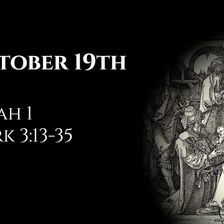
October 19th: Isaiah 1 & Mark 3:13-35
Alastair Roberts
October 18, 2021
The beginning of Isaiah's prophecy. The choice of the Twelve.
My reflections are searchable by Bible chapter here: https://audio.alastairadversaria.c
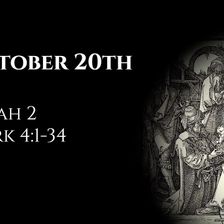
October 20th: Isaiah 2 & Mark 4:1-34
Alastair Roberts
October 19, 2021
The mountain of the Lord raised above the other mountains. Jesus teaches in parables.
My reflections are searchable by Bible chapter here: https://au
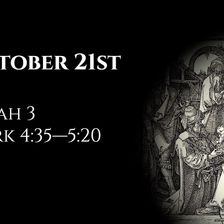
October 21st: Isaiah 3 & Mark 4:35—5:20
Alastair Roberts
October 20, 2021
The humbling of Judah, her sons and her daughters. Calming the storm and delivering the demoniac.
My reflections are searchable by Bible chapter here
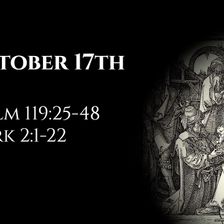
October 17th: Psalm 119:25-48 & Mark 2:1-22
Alastair Roberts
October 16, 2021
Psalm 119:25-48. Eating with tax collectors and sinners.
My reflections are searchable by Bible chapter here: https://audio.alastairadversaria.com/ex
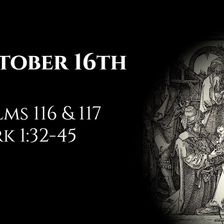
October 16th: Psalms 116 & 117 & Mark 1:32-45
Alastair Roberts
October 15, 2021
Psalms 116 & 117. Preaching and healing in Galilee.
My reflections are searchable by Bible chapter here: https://audio.alastairadversaria.com/explore
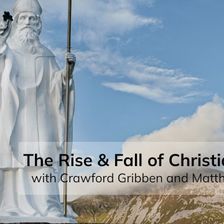
The Rise & Fall of Christian Ireland (with Crawford Gribben and Matthew Brennan)
Alastair Roberts
October 15, 2021
Crawford Gribben (Queen's University Belfast) and Matthew Brennan (Clonmel Baptist Church) join me for a discussion of Crawford's recently released hi
More on OpenTheo

Prove to Me That Jesus Is Not a Created Being
#STRask
January 26, 2026
Questions about why we should think Jesus is not a created being, and what it means to say God became fully human if part of being human means not bei

Conservatism and Religious Freedom with John Wilsey
Life and Books and Everything
October 27, 2025
What is conservatism? And why does it go hand in hand with religious freedom? How should we think about the American experiment of ordered liberty? Ha

Kingdom Priorities: Following the Teachings of Jesus
Knight & Rose Show
February 14, 2026
Wintery Knight and Desert Rose discuss Jesus' teachings from the Gospels, emphasizing truth, evidence, self-denial, and forgiveness. They explore pass

Life and Ministry in Charlotte and in the SBC with Clint Pressley
Life and Books and Everything
December 15, 2025
In a rare cultural anomaly that may never be repeated in our lifetimes, the current SBC President and current PCA Moderator live in the same neighborh

The Heidelberg Catechism with R. Scott Clark
Life and Books and Everything
November 3, 2025
You may not think you need 1,000 pages on the Heidelberg Catechism, but you do! R. Scott Clark, professor at Westminster Seminary California, has writ

Can Two Logical People Come to Conflicting Conclusions Without Committing a Fallacy?
#STRask
January 8, 2026
Questions about whether two logical people can come to conflicting conclusions on a topic without committing a fallacy, how Greg, as a public figure,

Is It a Sin to Feel Let Down by God?
#STRask
November 6, 2025
Questions about whether it’s a sin to feel let down by God and whether it would be easier to have a personal relationship with a rock than with a God

Does God Hear the Prayers of Non-Believers?
#STRask
February 26, 2026
Questions about whether or not God hears and answers the prayers of non-believers, and thoughts about a church sign that reads (as if from God), “Just

Can You Provide Verifiable, Non-Religious Evidence That a Supernatural Jesus Existed?
#STRask
November 10, 2025
Question about providing verifiable, non-religious evidence that a supernatural Jesus existed.
* I am an atheist and militantly anti-god-belief. Ho

When I Can’t Stop Thinking About Something, Is That God Speaking?
#STRask
December 1, 2025
Questions about whether having a recurring thought is an indication God is speaking to you, what to say to someone who says they sinned because “God t

What Do You Think About Churches Advertising on Social Media?
#STRask
January 19, 2026
Questions about whether there’s an issue with churches advertising on social media, whether it’s weird if we pray along with a YouTuber, and whether C

Are Demon Possessions and Exorcisms in the New Testament Literal?
#STRask
December 11, 2025
Questions about whether references to demon possessions and exorcisms in the New Testament are literal, how to talk to young children about ghosts, an

What About Those Who Never Heard the Name of Jesus?
#STRask
December 22, 2025
Questions about what will happen to those who never heard of Jesus or were brought up in a different faith, whether there’s biblical warrant to think

Is It Possible There’s a Being That’s Greater Than God?
#STRask
February 5, 2026
Questions about whether it’s possible there’s a being that’s greater than God and that’s outside of God’s comprehension and omniscience, and how to ex

Why Would Any Rational Person Have to Use Any Religious Book?
#STRask
December 8, 2025
Questions about why any rational person would have to use any religious book, whether apologetics would be redundant if there were actually a good, un
